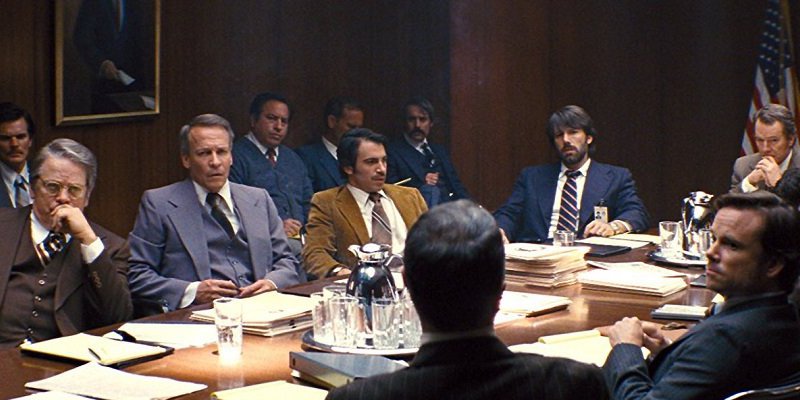-

“Phoenix is hot” and other unexpected trademarks owned by the Arizona capitol
Request for records related to Phoenix, Arizona’s federally trademarked bird symbol reveals a surprising trove of city-owned phrases.
-

Officials’ Facebook posts remain a public records grey area
With the option to air grievances and conduct discussions via direct messages and private posts, some cities are able to sidestep public records laws. Is yours among them?
-

Requester’s Voice: National Security Cinema’s Tom Secker
Tom Secker and Matthew Alford spent years digging into a secret that was hiding in plain sight. Or rather, hiding in movie theaters, television sets, and streaming services everywhere: The secret influence the Department of Defense and intelligence community had on Hollywood. In this Requester’s Voice, Secker shares what he learned.
-

In the ‘80s, the CIA wanted NASA to bring the Cold War to the moon
Memos unearthed in the Central Intelligence Agency archives show that at the height of Reagan’s renewed Cold War, the CIA’s Deputy Director - future Secretary of Defense Robert Gates - suggested that the National Aeronautics and Space Administration counter Soviet ambitions of a manned mission to Mars by establishing a permanent base on the moon.
-

FBI file reveals numerous contradictions in the curious case of Sergei Kourdakov
Shortly before he was set to testify before Congress, Soviet defector Sergei Kourdakov’s “accidentally” committed suicide with a gun the Central Intelligence Agency allegedly told him to illegally get - and the Federal Bureau of Investigation refused to investigate.
-

FOIAing the Trump Administration: What’s going on at the EPA?
The Environmental Protection Agency last week pledged to clear out its backlog of FOIA requests from the Obama administration, but the agency is at the same time experiencing a glut of new requests. This week, we take a close look at the notable successes and frustrations of FOIAing Trump’s EPA.
-

The mysterious death of a Soviet defector with ties to alleged CIA-funded Christian group
Sergei Kourdakov’s story is controversial, unusual, and utterly unforgettable. From when the Soviet defector swam from a Russian trawler to Canada until his supposed accidental suicide with a gun a Central Intelligence Agency officer allegedly told him to illegally get shortly before he would testify before Congress, his tale is straight out of a pulp fiction spy thriller - with an evangelical twist complete with bible smugglers who may have had CIA ties of their own.
-

MuckRock Release Notes: Recurring donations, just in time for Giving Tuesday
This Giving Tuesday, we’ve launched a new feature that allows you to make an automatic monthly donation to help support government transparency.
-

How much did your town spend on its shot at being Amazon’s second headquarters?
Towns across the nation aren’t just offering Amazon decades of property tax-free residency. Some also spent taxpayer dollars to put together the bids for Amazon’s second headquarters. Fresno, California spent $1,000 for the promotional video they had made. Camden County, New Jersey, authorized spending up to $40,000 on the bid’s design, renderings, videos and more from an architecture firm. On the other hand, many places spent nothing at all.
-

Redacted Friday: Missing ethics oversight, ComputerCop follow up, plus save on FOIA swag
This week, we’re finding transparency never rests with important work being done following up on an old privacy scandal targeting young people, plus a look at how even a no responsive documents response can help show when public officials are asleep at the wheel.
-

Thank you to all the public records officers who make transparency possible
Since last year, MuckRock users have filed a collective 14,852 requests — but none of that would have been possible without dedicated public servants. This holiday, take a minute to thank a FOIA officer who helped make government open and accountable.
-

FOIAing the Trump Administration: scheduling priorities and declassification via tweet
Many impactful stories about the Trump administration began with FOIA requests for administration figures’ calendars, meeting schedules, and visitor logs. This week, we take a look at what these logs and calendars have revealed about administration priorities, as well as an interesting FOIA lawsuit based on Trump’s tweet.
-

Bayard Rustin was being investigated by the FBI while, unbeknownst to the Bureau, he was working for the CIA
Bayard Rustin was many things: He was a key organizer of the 1963 March on Washington, an advocate for Soviet Jewry, and, “a convicted homosexual,” according to his Federal Bureau of Investigation file. Despite being what many would consider a textbook lefty, Rustin also moonlighted for the Central Intelligence Agency. While that might seem like an irreconcilable contradiction for a man who sat in prison for two years because he refused to serve in World War II, but contradictions aren’t there to be reconciled, they’re there to confound.
-

The CIA studied the impact of space storms on psychic powers
When then-President Barack Obama signed an Executive Order on geomagnetic storm preparedness, spiritual side effects of space weather events were criminally neglected. Apparently the Central Intelligence Agency took the issue of solar flare-induced psychic phenomena more seriously, however, dedicating part of of its 824 page risk report on it.
-

After a five-year hiatus, Kentucky is reconnecting with private prisons
With a prison population straining within aging facilities and under the effects of opioid addiction, the Bluegrass State is returning to the Lee Adjustment Center to house some of its inmates.
-

How San Francisco’s bid for Amazon’s second headquarters does - and doesn’t - discuss gentrification
The tech-filled San Francisco Bay Area bidded on Amazon’s second headquarters, without giving much attention to how much that headquarters would gentrify some of the last remaining affordable spaces in the Bay.
-

Records show D.C. Police used an LRAD sound cannon to “direct crowd flow” during the Women’s March
Records released last week show D.C. Metropolitan Police Department employed a Long Range Acoustic Device during the Women’s March to “direct the crowd flow.” This is the latest evidence of an worrying trend in which police departments are increasingly using the incredibly powerful LRAD to deal with non-violent protests at the risk of causing permanent hearing loss.
-

J. Edgar Hoover once called the Bill of Rights “literature favorable to Russia and in opposition to the U.S. foreign policy.”
A recently released Federal Bureau of Investigation file shows that then-director J. Edgar Hoover personally wrote to the head of the Internal Revenue Service to complain about the tax exempt status of pro-peace groups, alleging they were led by ‘concealed Communists’ and that they sent out “literature favorable to Russia and in opposition to the U.S. foreign policy” - literature such as the Bill of Rights.
-

Using public documents to show the high cost of secrecy
Whether you’re digging into state house harassment or what public employees get paid to quit their job, there’s some great examples to learn from reading the reporting out there. Here’s some of our favorites from this past week.
-

Is the government spending money on it? Well, then, you have a right to know about it.
Every year, literally hundreds of billions of tax dollars are spent on contracting agreements with private businesses. And all of them are subject - to some extent - to public records laws and inspections.
-

Pentagon claims list of information exempt from FOIA is exempt from FOIA
Earlier this year, Emma Best filed a Freedom of Information Act request for a copy of the Department of Defense’s most recent declassification guide, with the goal of better understanding what the Pentagon believes can or can’t be released to the public. Just this week, the guide came in but with one notable omission: the entire section on what the Pentagon believes can or can’t be released to the public
-

Maine town tries to charge MuckRock $750 for opening an email
This week, in absurd and illegal requests, Maine’s Midcoast Regional Redevelopment Authority said that MuckRock is required to pay $750 because we opened the email they sent with their 37-page bid for Amazon second headquarters.
-

To get some immigration-related records, FOIA is the only option
The United States of America is the primary destination for more members of the global migrant population than any other country. To handle the constant influx of foreign individuals - both legally-authorized and otherwise - across the borders, the federal government relies on a handful of agencies to funnel foreign visitors and residents in and out of the country. The Freedom of Information Act and equivalent state laws can help to shed some light into how the immigration system on all levels is working - or not.
-

Massachusetts towns reveal their bids for Amazon’s second headquarters
Massachusetts towns are disclosing their bids for Amazon’s second headquarters, when many places across the country refuse to. Everywhere from Halifax, Canada to Los Angeles is vying for Amazon’s heart (and dollars) in the semi-public bidding war started in September, but many towns across the country won’t disclose what they’re offering Amazon in return for the second headquarters.
-

The Las Vegas Metropolitan Police Department’s missing missing person requests
After an unflattering depiction in “The Vanished” podcast, Las Vegas Metropolitan Police Department has adopted an ever-changing set of rules for accessing public records on missing persons.